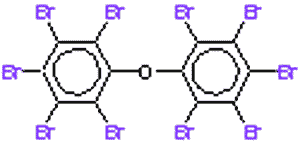|
Another reason for a War on Plastic:
Additive Deca-BDE

by Jan Lundberg
|
Polybrominated diphenyl ethers (PBDE family) are flame retardants that behave in rats like PCBs do, and are all over the environment, the way DDT ended up in the Arctic. Two kinds of PBDE were banned but a third type, deca-BDE, was excluded from regulations -- "a grave error," according to a new feature story in the East Bay Express (California) weekly newspaper. The following continues my summary of the article:
|
Deca-BDE is in breast milk, and exposures early in life can alter reproductive structures, lower sperm count, delay puberty, and damage the ovaries. Five percent of the population has quite high levels, "a margin of safety that is pretty low," according to the California EPA's Office of Environmental Health Hazard Assessment.
Deca is made worldwide to the tune of 125 million pounds every year, as "...an additive to high-impact polystyrene plastics used in a wide variety of products: hair dryers, toasters, curling irons, coffeemakers, TVs, computer casings, printers, fax machines, smoke detectors, and light fixtures. It is used in very large amounts - up to 15% of the plastic by weight. It is also added to backing in textiles for drapes, furniture, and rugs, and to some polyurethane foams."
A Calif. Dept. of Toxic Substances Control researcher, Dr. Kim Hooper, says "The myth was that it is stable, doesn't degrade, doesn't disperse, stays in sediment or products, is not metabolized, and is not taken up by biota." Deca is nearly everything it was assumed not to be, so its widespread use means an enormous reservoir of the chemical accumulates indoors, where people spend more than 80 percent of their time. It has been found at significant levels in household dust, in the film on the inside of windows, and in office air. Like penta, octa and PCBs, it now also appears to cause neurodevelopmental damage in animals. Deca goes through the body rapidly, but may be broken down by sunlight into smaller molecules including its toxic, banned family members.
Dr. Hooper: "The final reality is that we have more than a half-billion pounds of the stuff above ground in consumer products in close human contact, and another half-billion below ground in sediment. This billion pounds eventually breaks down; into what, we don't know."
"As the foam in sofa cushions breaks down in landfills over time, for example, the released PBDEs get carried by the wind and are deposited far and wide - the 'grasshopper effect'. The toxins ultimately work their way up the food chain to accumulate in humans and predatory animals."
The Environmental Working Group studies PBDEs in dust and breast milk, says "we're finding chemicals in everyday household products - furniture, Teflon pans, cosmetics - to be very dangerous."
I have sent the East Bay Express my War on Plastics article, offering it for publication as a follow up to "The Gorilla In The Closet" on deca-BDE. I said "Plastics is the papa gorilla." Our exposure in the East Bay Express could result in a large turnout to the showing of Our Synthetic Sea in a large Oakland theater we are approaching.
As alarming as the story in the East Bay Express is, it contains no conclusion along the lines that we should not be buying or using the consumer junk that people think they need.
-
– Jan Lundberg

See www.ewg.org/reports/inthedust
and the full story from East Bay Express:
eastbayexpress.com/issues/2005-02-16/cityside.html
To recommend Culturechange mailing list to a friend, send this link:
http://lists.mutualaid.org/mailman/listinfo/culturechange
To support the nonprofit Culture Change and its projects, make a donation ONLINE.
To help me promote Culture Change's activities such as the reprinting and circulation online of articles, you may send a donation by visiting
http://www.culturechange.org/funding.htm. Thank you. Keep Culture Change alive. We have no grants or subsidies, only the public's donations.
Jan Lundberg
P.O. Box 4347
Arcata
CA 95518 USA
Tel. 1-215-243-3144
To recommend Culturechange mailing list to a friend, send this link:
http://lists.mutualaid.org/mailman/listinfo/culturechange
If you are interested in receiving Culture Change's e-letter you can sign up to get Culture Change Letter directly, by clicking here: E-Letter
Jan Lundberg, co-founded the Lundberg Letter, called "the bible of the oil industry", in 1973. Mr. Lundberg ran Lundberg Survey Incorporated for the petroleum industry, utilities and government. He founded the Sustainable Energy Institute (SEI) in 1988.
We promote and practice cultural change as key to sustainability. Does economic growth via fossil fuels and materialism provide real security? A sustainable society features car-free living and growing food locally. Communities must return to self-sufficiency for food and energy.
Culture Change and SEI:
P.O. Box 4347
Arcata
California 95518
USA
E-mail: info@culturechange.org
Website: www.CultureChange.org
Published by Sustainable Energy Institute, a nonprofit charity 501(c)(3) California corporation.
To support Culture Change/Sustainable Energy Institute and its projects, make a tax-deductible donation http://www.culturechange.org/funding.htm. Keep Culture Change alive. We have no grants or subsidies, only the public's donations.
|
|

